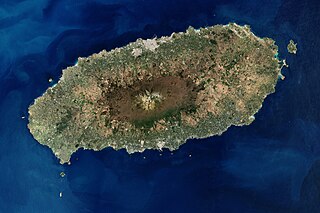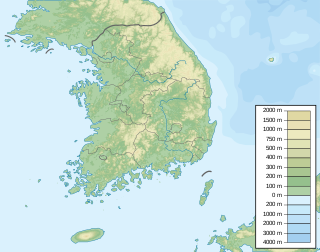Related Research Articles

Paektu Mountain, also known as Baekdu Mountain, and in China as Changbai Mountain, is an active stratovolcano on the Chinese–North Korean border. At 2,744 m (9,003 ft), it is the highest mountain of the Changbai and Baekdudaegan ranges. Koreans assign a mythical quality to the volcano and its caldera lake, considering it to be their country's spiritual home. It is the highest mountain in North Korea, the Korean Peninsula, and Northeast China.

The Korean Peninsula is a peninsula located in East Asia. It extends southwards for about 1,100 km (680 mi) from continental Asia into the Pacific Ocean and is surrounded by the Sea of Japan to the east and the Yellow Sea to the west, the Korea Strait connecting the two bodies of water.
Korean Air Lines Co., Ltd., operating as Korean Air, is the largest airline and flag carrier of South Korea based on fleet size, international destinations and international flights. The airline's global headquarters are located in Seoul, South Korea. Korean Air was founded as Korean National Airlines in 1946. After several years of service and expansion, the airline was fully privatized in 1969.

Gyeonggi-do is the most populous province in South Korea. Its name, Gyeonggi, means "the area surrounding the capital". Thus Gyeonggi-do can be translated as "province surrounding Seoul". The provincial capital is Suwon. Seoul—South Korea's largest city and national capital—is in the heart of the province but has been separately administered as a provincial-level special city since 1946. Incheon—South Korea's third-largest city—is on the coast of the province and has been similarly administered as a provincial-level metropolitan city since 1981. The three jurisdictions are collectively referred to as Sudogwon and cover 11,730 km2 (4,530 sq mi), with a combined population of 25.5 million—amounting to over half of the entire population of South Korea.

Buddhist temples are an important part of the Korean landscape. This article gives a brief overview of Korean Buddhism, then describes some of the more important temples in Korea. Most Korean temples have names ending in -sa, which means "temple" in Sino-Korean.

Chungju is a city in North Chungcheong province, South Korea. Namsan is a mountain located within the outskirts of the city.

Taebaek is a city in Gangwon province, South Korea. Its name is shared with that of the Taebaek Mountains. Situated at an altitude of 650 to 700 m, Taebaek is the highest city in South Korea.

Pyeongchang is a county in the province of Gangwon-do, South Korea, located in the Taebaek Mountains region. It is home to several Buddhist temples, including Woljeongsa. It is about 180 km (110 mi) east southeast of Seoul, the capital of South Korea, and connected by expressways and high-speed passenger railways. Pyeongchang's slogan, "Happy 700 Pyeongchang", is taken from its average elevation of approximately 700 metres (2,300 ft).

Gwangyang is a city in South Jeolla Province, South Korea. Gwangyang city is the home of POSCO's Gwangyang Steel Works, the largest facility of its kind in the world. The city is also home to K League Classic football side Jeonnam Dragons.

Yeoju is a city in Gyeonggi Province, South Korea. Yeoju was a county but was raised to the status of a city in September 2013. Together with the neighboring city of Icheon, it is known as a major center of contemporary South Korean ceramics, and hosts the World Ceramic Exposition every year. Other local products of note include rice, sweet potatoes, and yellow melons. Yeoju is the birthplace of Korea's last queen, Empress Myeongseong.

Jeju Island is an island in the Jeju Province of South Korea. The island lies in the Korea Strait, below the Korean Peninsula, south of the South Jeolla Province. The island contains the natural world heritage site, Jeju Volcanic Island and Lava Tubes. Jeju has a moderate climate; even in winter, the temperature rarely falls below 0 °C (32 °F). Jeju is a popular holiday destination and a sizable portion of the economy relies on tourism and economic activity from its civil/naval base.
Cheonmasan is a mountain in Gyeonggi-do, South Korea. It can be found within the boundaries of the city of Namyangju. Cheonmasan has an elevation of 810.2 m (2,658 ft).
Amisan is a mountain in the county of Hongcheon, Gangwon-do in South Korea. It has an elevation of 960.8 m (3,152 ft).

Taesŏngsan is a mountain in Taesong-guyok, Pyongyang, North Korea. It has an elevation of 270 metres (890 ft). One popular visitor attraction on Taesŏngsan is the outdoor ice rink. Others include the Revolutionary Martyrs' Cemetery and the Korea Central Zoo.
Obongsan is a mountain of North Korea. It has an elevation of 1,264 metres. It stands between Kumgang and Kosong County in Kangwon Province.

Jaeyaksan is a mountain of South Korea. It has an elevation of 1,108 metres. It is part of the Yeongnam Alps mountain range.
Amisan (아미산) is a mountain of Chungcheongnam-do, South Korea. It has an elevation of 630 metres (2,067 ft).

Maisan is a mountain of Jeollabuk-do, western South Korea. It has an elevation of 686 metres.

Muryongsan is a mountain of Jeollabuk-do, western South Korea. It has an elevation of 1,492 metres (4,895 ft).

Hwawangsan or Hwawang, is a mountain in Changnyeong County of South Gyeongsang Province, southeastern South Korea. It has an elevation of 757 metres.
References
- ↑ An Gyeong-ho (2007). 한국 300 명산 (300 Korean Mountains). Seoul: 깊은솔 (Gipeunsol). ISBN 978-89-89917-21-2.
| This South Korea location article is a stub. You can help Wikipedia by expanding it. |